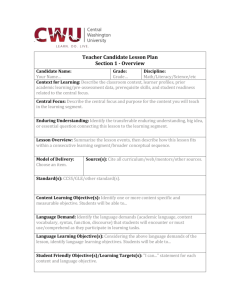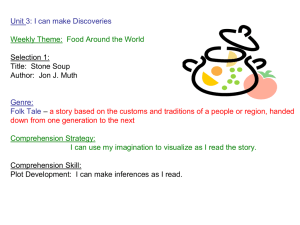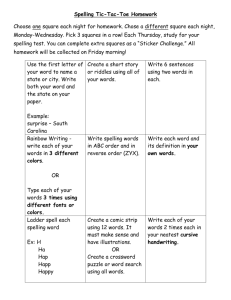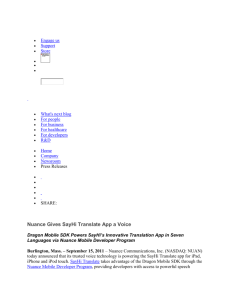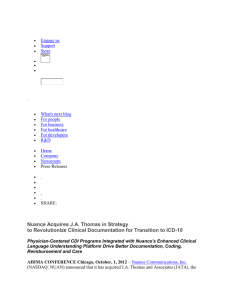Writing Response to Reading Comprehension Level 1
advertisement
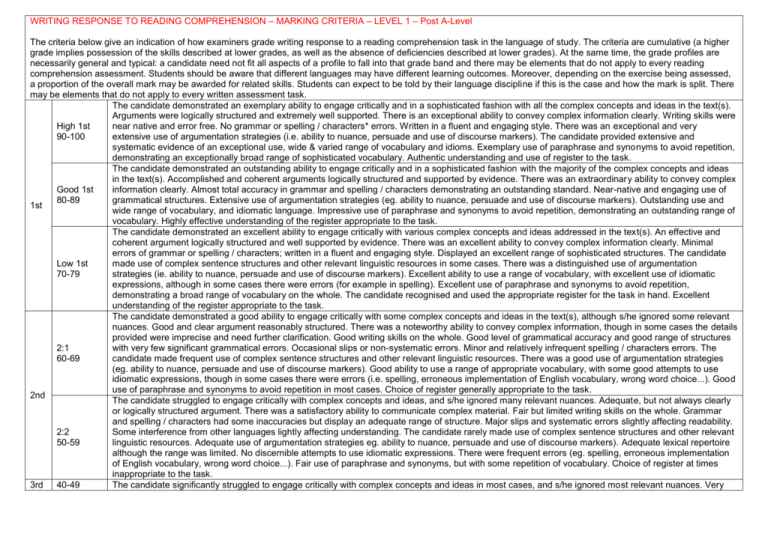
WRITING RESPONSE TO READING COMPREHENSION – MARKING CRITERIA – LEVEL 1 – Post A-Level The criteria below give an indication of how examiners grade writing response to a reading comprehension task in the language of study. The criteria are cumulative (a higher grade implies possession of the skills described at lower grades, as well as the absence of deficiencies described at lower grades). At the same time, the grade profiles are necessarily general and typical: a candidate need not fit all aspects of a profile to fall into that grade band and there may be elements that do not apply to every reading comprehension assessment. Students should be aware that different languages may have different learning outcomes. Moreover, depending on the exercise being assessed, a proportion of the overall mark may be awarded for related skills. Students can expect to be told by their language discipline if this is the case and how the mark is split. There may be elements that do not apply to every written assessment task. The candidate demonstrated an exemplary ability to engage critically and in a sophisticated fashion with all the complex concepts and ideas in the text(s). Arguments were logically structured and extremely well supported. There is an exceptional ability to convey complex information clearly. Writing skills were High 1st near native and error free. No grammar or spelling / characters* errors. Written in a fluent and engaging style. There was an exceptional and very 90-100 extensive use of argumentation strategies (i.e. ability to nuance, persuade and use of discourse markers). The candidate provided extensive and systematic evidence of an exceptional use, wide & varied range of vocabulary and idioms. Exemplary use of paraphrase and synonyms to avoid repetition, demonstrating an exceptionally broad range of sophisticated vocabulary. Authentic understanding and use of register to the task. The candidate demonstrated an outstanding ability to engage critically and in a sophisticated fashion with the majority of the complex concepts and ideas in the text(s). Accomplished and coherent arguments logically structured and supported by evidence. There was an extraordinary ability to convey complex Good 1st information clearly. Almost total accuracy in grammar and spelling / characters demonstrating an outstanding standard. Near-native and engaging use of 80-89 grammatical structures. Extensive use of argumentation strategies (eg. ability to nuance, persuade and use of discourse markers). Outstanding use and 1st wide range of vocabulary, and idiomatic language. Impressive use of paraphrase and synonyms to avoid repetition, demonstrating an outstanding range of vocabulary. Highly effective understanding of the register appropriate to the task. The candidate demonstrated an excellent ability to engage critically with various complex concepts and ideas addressed in the text(s). An effective and coherent argument logically structured and well supported by evidence. There was an excellent ability to convey complex information clearly. Minimal errors of grammar or spelling / characters; written in a fluent and engaging style. Displayed an excellent range of sophisticated structures. The candidate Low 1st made use of complex sentence structures and other relevant linguistic resources in some cases. There was a distinguished use of argumentation 70-79 strategies (ie. ability to nuance, persuade and use of discourse markers). Excellent ability to use a range of vocabulary, with excellent use of idiomatic expressions, although in some cases there were errors (for example in spelling). Excellent use of paraphrase and synonyms to avoid repetition, demonstrating a broad range of vocabulary on the whole. The candidate recognised and used the appropriate register for the task in hand. Excellent understanding of the register appropriate to the task. The candidate demonstrated a good ability to engage critically with some complex concepts and ideas in the text(s), although s/he ignored some relevant nuances. Good and clear argument reasonably structured. There was a noteworthy ability to convey complex information, though in some cases the details provided were imprecise and need further clarification. Good writing skills on the whole. Good level of grammatical accuracy and good range of structures 2:1 with very few significant grammatical errors. Occasional slips or non-systematic errors. Minor and relatively infrequent spelling / characters errors. The 60-69 candidate made frequent use of complex sentence structures and other relevant linguistic resources. There was a good use of argumentation strategies (eg. ability to nuance, persuade and use of discourse markers). Good ability to use a range of appropriate vocabulary, with some good attempts to use idiomatic expressions, though in some cases there were errors (i.e. spelling, erroneous implementation of English vocabulary, wrong word choice...). Good use of paraphrase and synonyms to avoid repetition in most cases. Choice of register generally appropriate to the task. 2nd The candidate struggled to engage critically with complex concepts and ideas, and s/he ignored many relevant nuances. Adequate, but not always clearly or logically structured argument. There was a satisfactory ability to communicate complex material. Fair but limited writing skills on the whole. Grammar and spelling / characters had some inaccuracies but display an adequate range of structure. Major slips and systematic errors slightly affecting readability. 2:2 Some interference from other languages lightly affecting understanding. The candidate rarely made use of complex sentence structures and other relevant 50-59 linguistic resources. Adequate use of argumentation strategies eg. ability to nuance, persuade and use of discourse markers). Adequate lexical repertoire although the range was limited. No discernible attempts to use idiomatic expressions. There were frequent errors (eg. spelling, erroneous implementation of English vocabulary, wrong word choice...). Fair use of paraphrase and synonyms, but with some repetition of vocabulary. Choice of register at times inappropriate to the task. 3rd 40-49 The candidate significantly struggled to engage critically with complex concepts and ideas in most cases, and s/he ignored most relevant nuances. Very Fail 0-39 basic arguments with little attempt to link a limited number of ideas, which made the structure difficult to follow. There was a limited but sufficient ability to convey basic and/or complex information. Limited but sufficient writing skills on the whole. Grasp of basic grammar, spelling / characters and sentence structure, but many inaccuracies and very limited control of syntax pattern. Very limited but sufficient use of complex sentence structures and other relevant linguistic resources, frequently erroneous. There was a limited though sufficient use of argumentation strategies (eg. ability to nuance, persuade and use of discourse markers). Patchy or restricted use of vocabulary and idioms. No attempt to use any idiomatic expressions. Very frequent spelling mistakes and major errors clearly affecting readability. Substantial interference from other languages impeding communication. Very limited use of paraphrase and synonyms, leading to frequent repetition of vocabulary. Mostly inappropriate register for the text. The candidate was unable to engage critically with either basic or complex ideas. Deficient arguments. No attempt to construct an argument and incoherent or illogical structure. There was a lack of ability to convey basic information and many of the details provided were hard to follow. Lack of writing skills on the whole. Grammar and spelling / characters were significantly inaccurate and very limited. The candidate merely attempted basic structures in most cases. Lack of complex sentence structures and other relevant linguistic resources. The candidate attempted virtually no argumentation strategies (eg. ability to nuance, persuade and use of discourse markers). No awareness of lexical repertoire. Many repetitions because of the limitations in the knowledge of vocabulary. Extremely frequent spelling mistakes and major errors clearly affecting readability. Pervasive and substantial interference from other languages impeding communication. S/he failed to recognise and use the appropriate register.




